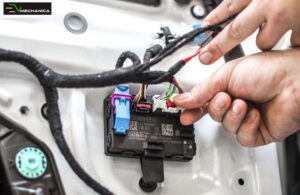![]() With cars dubbed as the computer on wheels as a common notion, the world of automotive has expanded its reach in the integration of hundreds of electronic control units (ECUs), essentially called the brains controlling everything.
With cars dubbed as the computer on wheels as a common notion, the world of automotive has expanded its reach in the integration of hundreds of electronic control units (ECUs), essentially called the brains controlling everything.
Starting from the breaks and headlights to the latest gadgets like parking cameras and radar, ECUs play an integral role in the management of electronic-based systems wired into the car making it a prime example of next-generation vehicles.
Known as the soul of electronics, semiconductor chips are responsible for at least ninety percent of the innovations happening in the automobile industry specifically for electric vehicles who are gaining much traction in the last few years.
According to the experts, Semiconductor Chips & Advance Electronics in EVs have opened an unfathomable wave of opportunities for vehicle development as these next-generation chips enable automotive designers to solve some of the most pressing issues facing the EV industry.
Nevertheless, to gain a new perspective on the Semiconductor Chips & Advance electronics in EVs, let’s dive into the deep trenches of What Makes Semiconductor So Integral for the EV Industry and How Far can these Chips Impact the Development of EVs in the long run?
What Makes Semiconductor Chips in EV Industry So Special?
 Entry of Semiconductor Chips in EV Industry brought along a variety of flavor to the segment with touch-screen interaction feature with the driver and passengers, boosting the range of electric vehicle (EV) batteries and components in the power train.
Entry of Semiconductor Chips in EV Industry brought along a variety of flavor to the segment with touch-screen interaction feature with the driver and passengers, boosting the range of electric vehicle (EV) batteries and components in the power train.
Introduction of Semiconductor Chips in EV Industry with its precious metals allows the designer to power the vehicle’s battery systems and enables the feature of updates to firmware, something that has played an increased role in the world of vehicles today.
Semiconductor Chips & Advance Electronics in EVs allows electric vehicles to become smarter and safer which makes them invaluable when human lives are at stake. Many vehicles system have internet connectivity nowadays that enables a vehicle manufacturer to dispatch updates to parts of the car’s firmware, like the brake system, without the customer even needing to opt-in.
It all boils down to the fact, the more digitally advanced the electric vehicle is, the more semiconductor chips it requires.
With features like autonomous driving and blind-spot detection becoming more widespread, the electric vehicle space will need access to more Semiconductor Chips in EV Industry.
How Far Can Semiconductor Chips Affect Electric Vehicles?
 Apart from accelerating performance features like range and charge time, Semiconductor Chips in EV Industry have also made batteries more efficient.
Apart from accelerating performance features like range and charge time, Semiconductor Chips in EV Industry have also made batteries more efficient.
However, to better summarize it with more examples and features, here’s a list of different features that are impacted since the Semiconductor Chips and advance electronics in EVs that includes,
Wireless Battery Management System
Enabling the flexibility to design a high-voltage battery management system that is wireless while removing the need for bulky wiring as well as improving driving range, performance and overall maintenance, a set of integrated circuits (ICs), allows the auto manufacturers to make this happen.
Fast & Efficient Charging Times
Semiconductor Chips & Advance Electronics in EVs can move the performance of batteries towards higher voltages and more efficient onboard chargers. With a real-time microcontroller portfolio, isolated gate drivers and fully integrated GaN power devices, the automotive designer can enable fast and efficient EV charging.
Enhanced Vehicle Safety
When it comes to safety, the standards employed globally as well as country specific have changed with the ongoing times and have improved the driving experience with advanced safety features, reliability and performance.
Automotive-qualified ICs, along with the associated functional safety documentation, can help engineers achieve their desired Automotive Safety Integrity Levels for their systems to enable a safer driving experience.
Optimum Performance on Road
Since the traction inverter system is a vital part of electric vehicles that enables optimal performance, these systems require high computational performance coupled with control features. This is where embedded processing chips come into play as they tend to work in concert with the dynamic output current control, like those from our isolated gate driver portfolio.
Role of Electronics in Next Generation EV Industry
 Working towards a common goal to achieve new heights, Semiconductor Chips & Advance Electronics in EVs has ushered a new era of software-defined vehicles wherein a cloud-connected smart battery concept holds great promise.
Working towards a common goal to achieve new heights, Semiconductor Chips & Advance Electronics in EVs has ushered a new era of software-defined vehicles wherein a cloud-connected smart battery concept holds great promise.
Integrating electronics with the modern electric vehicle development model, designers can try to build a digital twin model of the battery in the cloud, combining physical, machine learning, and AI algorithms while using data not just for a single car, but for the entire fleet.
Perks of such smart batteries include improved range prediction and efficiency of the battery, as well as boosted battery longevity.
This model can also enable faster charging and can assess the residual value of the battery and will help in reduce overall costs of ownership.
Furthermore, the development of power semiconductor devices has also accelerated the development of HEV/EVs that includes HEV power systems, drives, controls, or any luxury application that depends heavily on high-power switches.
